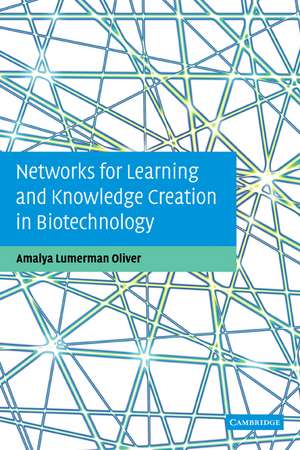Networks for Learning and Knowledge Creation in Biotechnology
Autor Amalya Lumerman Oliveren Limba Engleză Paperback – 2 mar 2011
| Toate formatele și edițiile | Preț | Express |
|---|---|---|
| Paperback (1) | 322.62 lei 6-8 săpt. | |
| Cambridge University Press – 2 mar 2011 | 322.62 lei 6-8 săpt. | |
| Hardback (1) | 489.01 lei 6-8 săpt. | |
| Cambridge University Press – 8 feb 2009 | 489.01 lei 6-8 săpt. |
Preț: 322.62 lei
Nou
Puncte Express: 484
Preț estimativ în valută:
61.73€ • 64.45$ • 51.09£
61.73€ • 64.45$ • 51.09£
Carte tipărită la comandă
Livrare economică 04-18 aprilie
Preluare comenzi: 021 569.72.76
Specificații
ISBN-13: 9780521188777
ISBN-10: 0521188776
Pagini: 272
Dimensiuni: 152 x 229 x 15 mm
Greutate: 0.39 kg
Editura: Cambridge University Press
Colecția Cambridge University Press
Locul publicării:Cambridge, United Kingdom
ISBN-10: 0521188776
Pagini: 272
Dimensiuni: 152 x 229 x 15 mm
Greutate: 0.39 kg
Editura: Cambridge University Press
Colecția Cambridge University Press
Locul publicării:Cambridge, United Kingdom
Cuprins
List of figures; List of tables; Acknowledgements; 1. Networks, collaborations and learning and knowledge creation; 2. The biotechnology industry through the lenses of organizational and networks scholarship; 3. New organizational forms for knowledge creation in biotechnology; 4. Scientific entrepreneurship; 5. Science and discoveries in the context of private and public knowledge creation and learning (with Julia Porter Liebeskind); 6. In search for university-industry collaborations: linear and chaotic networking processes; 7. Trust in collaborations and the social structure of academic research; 8. Organizational learning and strategic alliances: recombination and duality of competition and collaboration; 9. Further directions for understanding interorganizational collaborations and learning; References; Index.
Recenzii
Review of the hardback: 'This book makes a major contribution to our understanding of how networks and entrepreneurial action drive innovation. The book should therefore be of great value for scholars who are working in this area, but also for researchers, students, and practitioners who are interested in knowledge-intensive industries where networks and entrepreneurship dominates innovation and knowledge creation.' Joseph Lampel, Professor of Strategic Management, Cass Business School
Review of the hardback: 'This theoretical and empirical masterpiece impressively integrates multiple and cross-level analyses of new biotechnology firms. Amalya Oliver greatly extends our knowledge about intertwined networks among scientists, universities, start-ups, and big pharmas. Her rich and refined NBF model yields numerous unconventional insights into the tensions and dilemmas arising within learning alliances between academic norms about knowledge and market norms on profit. A judicious fusion of quantitative and qualitative methods discloses the centrality of trust relations for these managing the changing duality of competition and collaboration. Future analysts must reckon with this landmark study.' David Knoke, Professor Sociology, University of Minnesota
Review of the hardback: 'This is a progress-assessing and agenda-creating book in a number of respects. It bolsters the case for the importance of university research, especially of the top scientists, in stimulating and providing the knowledge base for commercial application of biotechnology and other new breakthrough technologies. Clearly, this is a book that will be appreciated by all working in the area of new technologies for its value in setting a clear agenda for the field and in providing tools that advanced students need to understand the development of new areas in science, technology, and industry.' Lynne G. Zucker, Professor of Sociology and Public Policy, UCLA
Review of the hardback: 'This theoretical and empirical masterpiece impressively integrates multiple and cross-level analyses of new biotechnology firms. Amalya Oliver greatly extends our knowledge about intertwined networks among scientists, universities, start-ups, and big pharmas. Her rich and refined NBF model yields numerous unconventional insights into the tensions and dilemmas arising within learning alliances between academic norms about knowledge and market norms on profit. A judicious fusion of quantitative and qualitative methods discloses the centrality of trust relations for these managing the changing duality of competition and collaboration. Future analysts must reckon with this landmark study.' David Knoke, Professor Sociology, University of Minnesota
Review of the hardback: 'This is a progress-assessing and agenda-creating book in a number of respects. It bolsters the case for the importance of university research, especially of the top scientists, in stimulating and providing the knowledge base for commercial application of biotechnology and other new breakthrough technologies. Clearly, this is a book that will be appreciated by all working in the area of new technologies for its value in setting a clear agenda for the field and in providing tools that advanced students need to understand the development of new areas in science, technology, and industry.' Lynne G. Zucker, Professor of Sociology and Public Policy, UCLA
Descriere
A stimulating account of how multiple theoretical perspectives can be used to understand the structure of the biotechnology industry.









